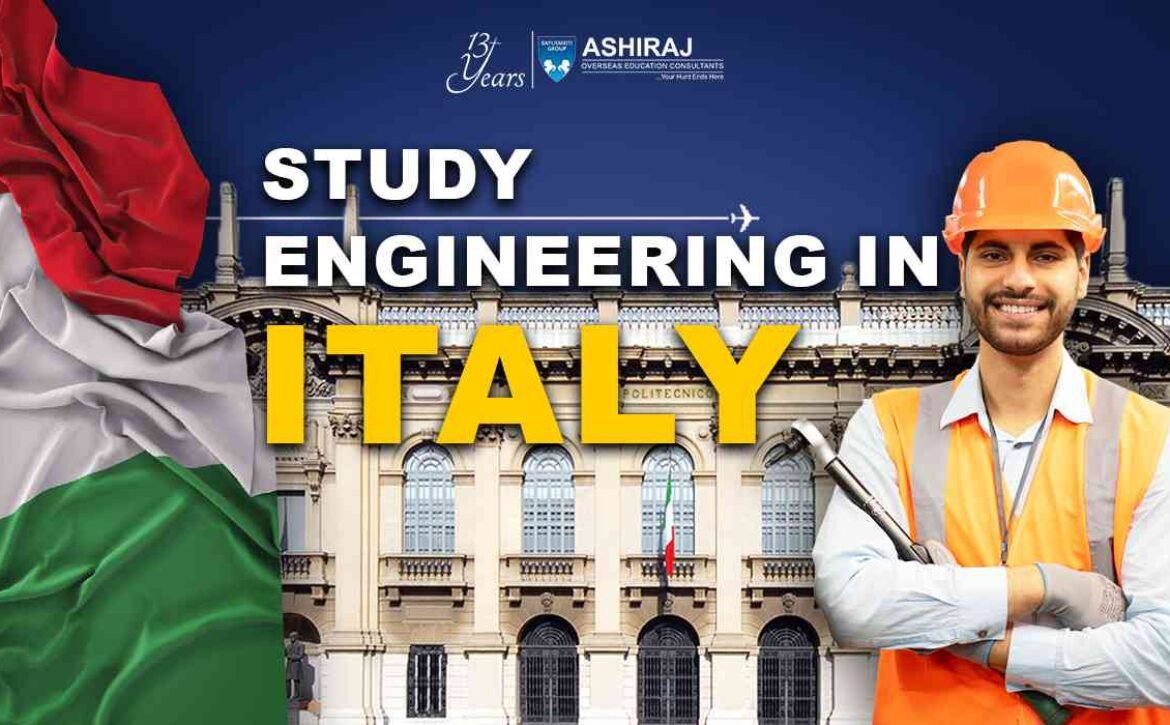
Engineering in Italy
Engineering in Italy offers a rich tapestry of innovation, tradition, and expertise that intertwines with the country’s historical legacy. Italy, renowned for its architectural marvels and artistic heritage, also boasts a vibrant engineering landscape characterized by cutting-edge research, advanced technology, and a deep-rooted commitment to quality craftsmanship. From the grandeur of Roman aqueducts to contemporary feats in renewable energy and automotive design, Italy’s engineering prowess resonates across diverse sectors.
Engineering in Italy encompasses a spectrum of disciplines, from civil and mechanical engineering to aerospace and automotive design, each reflecting Italy’s distinctive blend of creativity and technical precision. With renowned institutions like Politecnico di Milano and University of Bologna leading the charge in research and education, Italy stands as a beacon of excellence in engineering. Embracing both tradition and innovation, Engineering in Italy encapsulates the essence of Italian ingenuity, where ancient wisdom converges with modern technology to shape the future.
Why to Study Engineering in Italy?
- Historical Legacy: Italy boasts a rich history of engineering achievements, including iconic structures like the Colosseum and the Leaning Tower of Pisa, providing an inspiring backdrop for engineering students.
- Cutting-Edge Research: Italian universities such as Politecnico di Milano and University of Bologna are at the forefront of research in various engineering fields, offering students opportunities to engage in groundbreaking projects.
- Innovative Curriculum: Engineering programs in Italy combine theoretical knowledge with practical application, emphasizing hands-on experience and project-based learning.
- Cultural Experience: Studying engineering in Italy provides students with the chance to immerse themselves in the country’s rich cultural heritage, including its art, architecture, and culinary traditions.
- Global Perspective: Italy’s strategic location in Europe offers students exposure to diverse perspectives and networking opportunities within the European Union and beyond.
- Industry Connections: Italy is home to a thriving engineering industry, with opportunities for internships and collaborations with leading companies in sectors such as automotive, aerospace, and renewable energy.
- Quality of Life: With its beautiful landscapes, vibrant cities, and renowned cuisine, Italy offers an unparalleled quality of life for students pursuing engineering education.
Studying engineering in Italy provides a unique blend of academic excellence, cultural enrichment, and professional opportunities, making it an ideal destination for aspiring engineers. Engineering in Italy opens doors to a world of innovation and discovery, shaping the future of the field.
Top Universities to Study Engineering in Italy
University | QS World University Ranking 2023 | Type of University | Average Annual Fees | Programs Offered |
Politecnico di Milano | 30 | Public | €1,000 – €4,000 | Mechanical Engineering, Civil Engineering, Computer Engineering, Aerospace Engineering |
University of Bologna | 160 | Public | €900 – €3,000 | Electrical Engineering, Chemical Engineering, Environmental Engineering, Industrial Engineering |
Sapienza University of Rome | 190 | Public | €800 – €2,500 | Biomedical Engineering, Materials Engineering, Nuclear Engineering, Telecommunication Engineering |
University of Padua | 220 | Public | €800 – €3,000 | Automation Engineering, Mechatronics Engineering, Petroleum Engineering, Structural Engineering |
University of Trento | 250 | Public | €1,000 – €3,500 | Renewable Energy Engineering, Data Science Engineering, Robotics Engineering, Telecommunications Engineering |
Engineering in Italy thrives within its top universities, offering diverse programs and research opportunities to students worldwide. These institutions are globally recognized for their academic excellence and contributions to the field. With reasonable average annual fees and a wide array of engineering disciplines, students can pursue their passion for engineering while experiencing the rich cultural heritage of Italy. Whether in the bustling cities of Milan and Rome or the picturesque landscapes of Padua and Trento, students studying engineering in Italy benefit from a stimulating academic environment and access to cutting-edge research facilities. Engineering in Italy is a gateway to a dynamic career and a fulfilling educational experience amidst the backdrop of one of Europe’s most vibrant countries.
Course Curriculum for Engineering in Italy
- Interdisciplinary Approach: Engineering programs in Italy emphasize an interdisciplinary approach, integrating theoretical knowledge with practical application across various fields.
- Core Engineering Disciplines: Students delve into core engineering disciplines such as mechanical, civil, electrical, and computer engineering, gaining a comprehensive understanding of fundamental principles.
- Hands-on Learning: The curriculum emphasizes hands-on learning through laboratory sessions, design projects, and internships, allowing students to apply theoretical concepts to real-world engineering challenges.
- Focus on Innovation: Engineering programs in Italy prioritize innovation and creativity, encouraging students to develop critical thinking skills and problem-solving abilities essential for tackling complex engineering problems.
- Specialization Options: Students have the opportunity to specialize in areas such as aerospace engineering, renewable energy, biomedical engineering, and telecommunications, tailoring their education to align with their interests and career goals.
- Research Opportunities: Italy’s top universities offer ample research opportunities for engineering students, enabling them to collaborate with faculty members and industry partners on cutting-edge projects.
- International Perspective: The curriculum incorporates an international perspective, fostering global awareness and preparing students to navigate diverse cultural and professional environments in the field of engineering.
Engineering in Italy offers a dynamic and comprehensive course curriculum designed to equip students with the knowledge, skills, and experience needed to thrive in the ever-evolving field of engineering. Through a blend of theoretical coursework, practical experiences, and research opportunities, students embark on a transformative educational journey that prepares them for successful careers in engineering.
Eligibility Criteria & Admission Requirements for Engineering in Italy
- Language Proficiency: Prospective students must demonstrate proficiency in English by providing either IELTS or TOEFL scores. A minimum score of 6.5 on IELTS or 80 on TOEFL is typically required.
- Standardized Tests: Many engineering programs in Italy require applicants to submit scores from either GRE or GMAT exams. A competitive score in the range of 310-330 for GRE or 650-700 for GMAT is commonly expected.
- Passport & Student Visa: International students must possess a valid passport and obtain a student visa to study in Italy. The visa application process typically involves providing proof of acceptance to an Italian university, financial stability, and health insurance coverage.
- Academic Certificates: Applicants are required to submit official transcripts and academic certificates from previous educational institutions, demonstrating academic excellence and fulfilling prerequisites for engineering programs.
- Work Experience: While not always mandatory, some engineering programs may prefer applicants with relevant work experience in the field. Work experience can strengthen an application and provide valuable insights into the engineering profession.
Table: Standardized Test Scores
Test | Minimum Score |
IELTS | 6.5 |
TOEFL | 80 |
GRE | 310-330 |
GMAT | 650-700 |
Meeting the eligibility criteria for engineering programs in Italy ensures that students are adequately prepared for the academic rigor and cultural immersion that await them. Engineering in Italy offers a pathway to academic excellence and professional growth in one of Europe’s most vibrant countries.
Documents Required for Studying Engineering in Italy
- Passport: A valid passport is essential for international students applying to engineering programs in Italy, serving as proof of identity and nationality.
- Letters of Recommendation (LOR): Two letters of recommendation from academic or professional sources are typically required, highlighting the applicant’s academic achievements, character, and potential for success in engineering studies.
- Statement of Purpose (SOP): An SOP provides insight into the applicant’s academic and professional goals, explaining why they wish to pursue engineering in Italy and how it aligns with their career aspirations.
- Curriculum Vitae (CV): A comprehensive CV outlines the applicant’s educational background, work experience, skills, and achievements, providing admissions committees with a holistic view of their qualifications.
- Official High School Transcripts: Transcripts from high school or secondary education institutions demonstrate academic performance and serve as a basis for evaluating eligibility for engineering programs.
- Educational Certificates: Copies of educational certificates, including diplomas or degrees earned, validate academic qualifications and ensure compliance with program prerequisites.
- Work Experience Certificate: If applicable, a work experience certificate provides evidence of relevant professional experience in the field of engineering, enhancing the applicant’s candidacy.
- Proof of Financial Resources: Applicants must demonstrate sufficient financial resources to cover tuition fees, living expenses, and other related costs associated with studying engineering in Italy.
Preparing and submitting these documents is crucial for prospective students seeking admission to engineering programs in Italy. Meeting the documentation requirements ensures a smooth application process and enhances the chances of acceptance into esteemed engineering institutions. Engineering in Italy offers a wealth of opportunities for academic and professional growth, making it a sought-after destination for aspiring engineers worldwide.
Admission Process for Engineering in Italy
- Research Universities: Begin by researching engineering programs offered by universities in Italy, focusing on their specialties, faculty expertise, and accreditation. Identify institutions that align with your academic and career goals in engineering.
- Review Requirements: Carefully review the admission requirements for each university and program, including academic qualifications, standardized test scores, language proficiency, and documentation.
- Prepare Required Documents: Gather the necessary documents, such as transcripts, letters of recommendation, statement of purpose, CV, and proof of financial resources. Ensure that all documents are accurate, complete, and submitted according to the university’s guidelines.
- Language Proficiency: Take the required language proficiency tests, such as IELTS or TOEFL, and achieve the minimum scores specified by the universities. Strong English language skills are essential for success in engineering programs in Italy.
- Standardized Tests: Prepare for and take standardized tests like GRE or GMAT, if required by the universities. Achieve competitive scores that demonstrate your aptitude for engineering studies.
- Submit Application: Complete the online application forms for your chosen engineering programs, paying attention to deadlines and submission instructions. Provide detailed information about your academic background, achievements, and career aspirations.
- Follow-Up: Monitor your application status and follow up with the admissions office if necessary. Be proactive in addressing any questions or concerns throughout the application process.
- Acceptance and Enrollment: Upon receiving acceptance letters from universities, carefully review your options and make an informed decision. Complete the enrollment process by submitting any additional documentation required and confirming your intent to enroll.
Navigating the admission process for engineering programs in Italy requires thorough research, meticulous preparation, and attention to detail. Engineering in Italy offers a rewarding educational experience, preparing students for successful careers in a diverse range of engineering disciplines.
“Education is the most powerful weapon which you can use to change the world.”
Nelson Mandela
Cost of Engineering Course in Italy
- Tuition Fees: Engineering tuition fees in Italy vary depending on the university, program, and level of study. On average, tuition fees for international students range from €1,000 to €4,000 per year for undergraduate programs and €1,500 to €6,000 per year for master’s programs.
- Living Expenses: Living expenses in Italy, including accommodation, food, transportation, and miscellaneous costs, can range from €700 to €1,200 per month, depending on the city and lifestyle choices.
- Scholarship Opportunities: Many universities in Italy offer scholarships and financial aid programs for international students pursuing engineering degrees. Scholarships may be based on academic merit, financial need, or specific criteria set by the university or external organizations.
- Part-Time Work: International students in Italy are allowed to work part-time during their studies, typically up to 20 hours per week. Part-time employment can help offset living expenses and provide valuable work experience.
- Health Insurance: International students are required to have health insurance coverage while studying in Italy. Health insurance costs vary but are typically affordable compared to other countries.
- Additional Expenses: Additional expenses may include visa application fees, residence permit fees, books, study materials, and extracurricular activities.
Understanding the cost of studying engineering in Italy is essential for prospective students planning their education abroad. With careful financial planning and consideration of available resources, pursuing engineering in Italy can be a rewarding investment in one’s future. Engineering in Italy offers a blend of academic excellence, cultural immersion, and professional opportunities for aspiring engineers.
Scholarships for Engineering Courses in Italy
Scholarship Name | Amount | Application Deadline |
Italian Government Scholarships | Varies | March 15th |
Politecnico di Milano Scholarships | Up to €10,000 | May 31st |
University of Bologna Scholarships | Partial Tuition Waiver | April 30th |
Erasmus Mundus Scholarships | Fully Funded | Varies |
Leonardo da Vinci Scholarships | €5,000 – €20,000 | June 15th |
Engineering in Italy presents numerous scholarship opportunities for international students seeking financial assistance to pursue their studies. The Italian Government offers a variety of scholarships covering tuition fees, living expenses, and travel costs. Universities such as Politecnico di Milano and University of Bologna also provide scholarships ranging from partial tuition waivers to substantial financial support. The Erasmus Mundus program offers fully funded scholarships for exceptional students interested in joint master’s degree programs across European universities. Additionally, the Leonardo da Vinci scholarships support students pursuing engineering degrees with grants ranging from €5,000 to €20,000. Understanding the application deadlines and eligibility criteria for these scholarships is crucial for prospective engineering students looking to study in Italy. Scholarships for engineering in Italy alleviate the financial burden and make quality education more accessible to deserving students around the world.
Career Opportunities After Engineering in Italy
Job Profile | Average Salary (EUR) |
Mechanical Engineer | €35,000 – €45,000 |
Civil Engineer | €30,000 – €40,000 |
Electrical Engineer | €32,000 – €42,000 |
Software Engineer | €40,000 – €50,000 |
Aerospace Engineer | €38,000 – €48,000 |
Engineering in Italy opens doors to a plethora of career opportunities across various sectors. Mechanical engineers design and maintain machinery, with salaries ranging from €35,000 to €45,000 annually. Civil engineers oversee infrastructure projects and earn between €30,000 to €40,000 per year. Electrical engineers focus on power generation and distribution, commanding salaries from €32,000 to €42,000. Software engineers develop computer programs, earning salaries between €40,000 to €50,000 annually. Aerospace engineers design aircraft and spacecraft, with salaries ranging from €38,000 to €48,000. These career options reflect the diverse paths available to engineering graduates in Italy. With its blend of tradition and innovation, Engineering in Italy provides a fertile ground for professional growth and development, offering competitive salaries and rewarding career prospects in both traditional and emerging industries.
Frequently Asked Questions About Engineering in Italy
Yes, many engineering programs in Italy are offered in English, especially at the master’s and doctoral levels. Check with specific universities for language requirements.
Admission requirements typically include academic transcripts, standardized test scores (like GRE or GMAT), language proficiency (IELTS or TOEFL), letters of recommendation, and a statement of purpose.
Yes, various scholarships are available, both from the Italian government and individual universities. Check with the respective institutions and scholarship programs for eligibility criteria and application details.
Yes, international students in Italy are allowed to work part-time, usually up to 20 hours per week during the academic year and full-time during scheduled breaks.
The average cost of living, including accommodation, food, transportation, and miscellaneous expenses, ranges from €700 to €1,200 per month, depending on the city and lifestyle.
Yes, applicants are typically required to demonstrate proficiency in English through tests such as IELTS or TOEFL. Some programs may also accept English-taught previous degrees as proof.
The duration varies, but bachelor’s programs typically take three years, master’s programs last two years, and doctoral programs can take three to four years.
Yes, many engineering programs in Italy offer opportunities for internships, co-op programs, or industry collaborations, providing valuable practical experience.
Yes, Italy allows students to stay for job search purposes after completing their degree. Once employed, graduates can apply for a work permit and potentially settle in Italy.
Engineering graduates in Italy have promising career prospects, especially in sectors like manufacturing, automotive, aerospace, and technology. Salaries vary based on the field and experience, with competitive averages.




